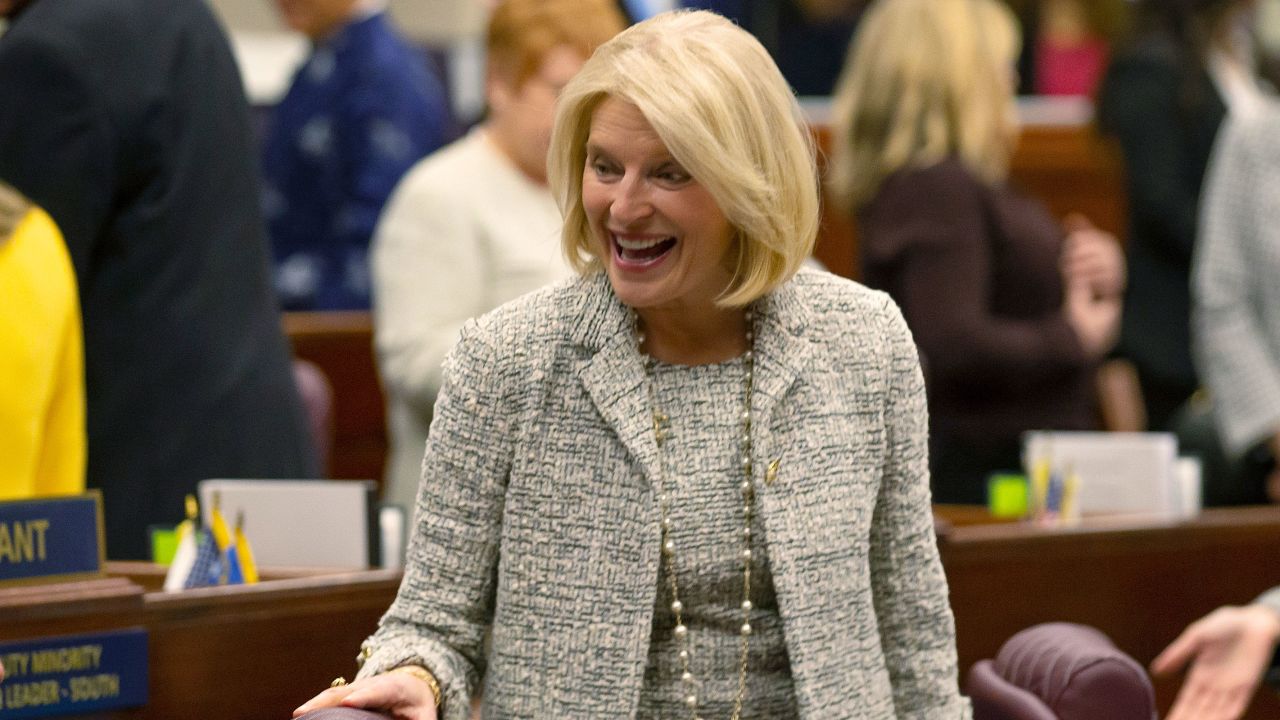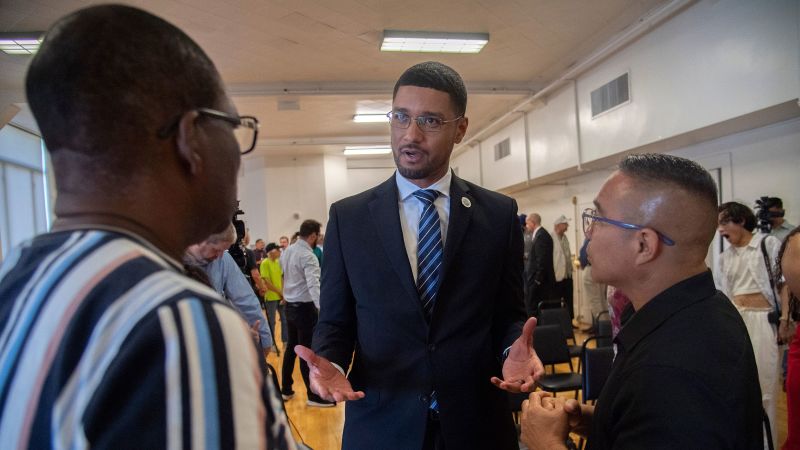In 2020, every single Republican who flipped a Democratic House seat was either a woman, veteran or minority.
Now, House Republicans are looking to replicate that same playbook in 2024 – when Donald Trump could once again be at the top of the ticket.
GOP officials have put a heavy emphasis this cycle on recruiting and boosting candidates from those three camps, which they see as essential in order to keep – and expand – their narrow majority next year. So far, nine veterans, five women and nine candidates of color have officially announced bids in suburban and Biden-won swing districts, according to an analysis provided to CNN by the National Republican Congressional Committee.
The latest candidate to throw their hat into the ring is Derrick Anderson, a combat veteran and former Green Beret who is vying to win the seat occupied by Democratic Rep. Abigail Spanberger of Virginia next fall. Anderson, who exclusively shared his plans with CNN, was personally recruited by Speaker Kevin McCarthy, the NRCC, and the Congressional Leadership Fund, a McCarthy aligned super PAC.
“I had a pretty large support network that had reached out to me. Leadership had said we think you should run again … (McCarthy) is the leader of the party, and there’s something to be said about that,” Anderson told CNN in an interview. “But it is about the people in the district.”
The reason the House GOP campaign arm sees veterans, women and minorities as key to the party’s success is because they tend to outperform the top of the ticket in suburban swing districts, where the battle for the House will be waged. The hope among Republicans is that this slate of candidates will help the GOP expand the map and compete in districts where they may not have otherwise had a shot.
“It’s not a secret, it’s a fact: to grow the majority Republicans must identify dynamic candidates with compelling life stories who relate to the voters they’re running to represent,” NRCC Chairman Richard Hudson said in a statement to CNN.
Anderson, who came up short in the primary last year, is seen by Republicans as a top recruit for the competitive race. Republicans have been heavily targeting Spanberger’s Biden-won district in Northern Virginia and failed to topple her in 2022. But the GOP thinks the seat will be even more winnable if Spanberger, a former CIA officer, opts to not seek reelection and instead makes a bid for governor – as Democratic sources have told CNN is her plan, and as Politico has previously reported.
Spanberger’s office declined to comment.
Other Republican veterans running in swing districts include Prasanth Reddy, an Indian-American doctor and Air Force reserve officer who enlisted in the days following 9/11; Kevin Lincoln, a Mexican and African American Marine veteran who is currently the mayor of Stockton, California; Rob Mercuri, a West Point grad and Bronze Star recipient for his service in Iraq; and Colorado state Rep. Gabe Evans, an Army veteran and former police officer.
“Veterans, first responders, all of those folks that raise their right hand and say ‘I believe in something bigger than myself, to the point where I’m willing to lay down my life and die for that’ … I think that resonates with people,” Evans, who is running in the Denver suburbs, told CNN.
GOP party officials are counseling candidates running in their top targeted seats to define their own brands and focus on local issues, in a bid to insulate themselves from any national headwinds.
Asked if he was concerned whether the presidential election will impact his race, Reddy – who is running for a seat outside Kansas City – told CNN: “It’s possible, but at the end of the day, my mom told me a long time ago: control what you can control … Focus on the things you can do, and do them well.”
But Democrats, too, are deploying a similar playbook: there are already five announced Democratic candidates who are veterans, including Mike O’Brien, a Marine and Top Gun pilot, and Missy Cotter Smasal, a Navy officer who just received a trio of endorsements from Democratic lawmakers in Virginia.
And Democrats think the GOP’s recruits, even if they are veterans, women or candidates of color, will be largely out of step with voters, and planning to tie them to the Trump wing of the party.
“While the Republican playbook is to recruit anti-abortion zealots, election deniers, and MAGA extremists, House Democrats continue to support leaders from all backgrounds and communities who are focused on the issues that matter most: protecting freedoms, lowering costs and growing the middle-class,” said Viet Shelton, a spokesperson for the Democratic Congressional Campaign Committee.

Given how women suburban voters left the party under Trump, Republicans are especially looking to female candidates to help them win back crucial seats in the next election cycle – when both Trump, and the topic of abortion, could be on the ballot.
The NRCC is buoyed by data from the last presidential election showing that females running in suburban districts consistently outran Trump in 2020: Rep. Young Kim of California outperformed Trump by 6.6%, Rep. Michelle Steel of California outperformed him by 2.9%; Rep. Maria Elvira Salazar of Florida outran him by 3.3%; and Rep. Beth Van Duyne of Texas outran him by 3.3%.
Among the Republican women who have already announced bids in swing districts are Heidi Kasama, a Nevada state legislator and Vegas area realtor; Erin Paré, a small business owner who defeated a Democrat incumbent to win a seat in the North Carolina House of Representatives; and Margarita Wilkinson, a Hispanic media executive who was born in Mexico City.
“I think the key to resonating with suburban moms is being a suburban mom yourself,” Paré said.
Added Wilkinson: “The Latino vote, that’s my forte. I know their needs. I know how to reach them. I know how to connect with them … I can mobilize those groups.”
But even though the GOP has made headway in electing more women and minorities in recent years, they still lag behind Democrats. There are 92 Democratic women serving in the House, versus 33 Republican women. Meanwhile, Democrats have 55 Black voting members in the House, versus 4 GOP members, and Democrats have 37 Hispanic voting members in the House, versus 15 GOP voting members.
One key issue to watch: After a disappointing election performance following the overturning of Roe v. Wade last year, Republicans are still figuring out their strategy on abortion – as evidenced by how some of their female candidates are messaging on the issue in their campaigns. Kasama said that while she is personally opposed to abortion for “religious reasons”, she respects the law in her state that allows abortion up to 24 weeks in a pregnancy, and would not support a stricter federal wide abortion ban if she were elected to Congress. But Paré, who helped author a North Carolina law banning abortions at 12 weeks, has more forcefully embraced her anti-abortion stance and said Republicans can win on the issue.
Read the full article here





